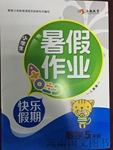题目内容
It’s an important event in history. Who knows _________?
A. when does it happen B. when it happens
C. when did it happen D. when it happened
练习册系列答案
 永乾教育寒假作业快乐假期延边人民出版社系列答案
永乾教育寒假作业快乐假期延边人民出版社系列答案
相关题目
题目内容
It’s an important event in history. Who knows _________?
A. when does it happen B. when it happens
C. when did it happen D. when it happened
 永乾教育寒假作业快乐假期延边人民出版社系列答案
永乾教育寒假作业快乐假期延边人民出版社系列答案